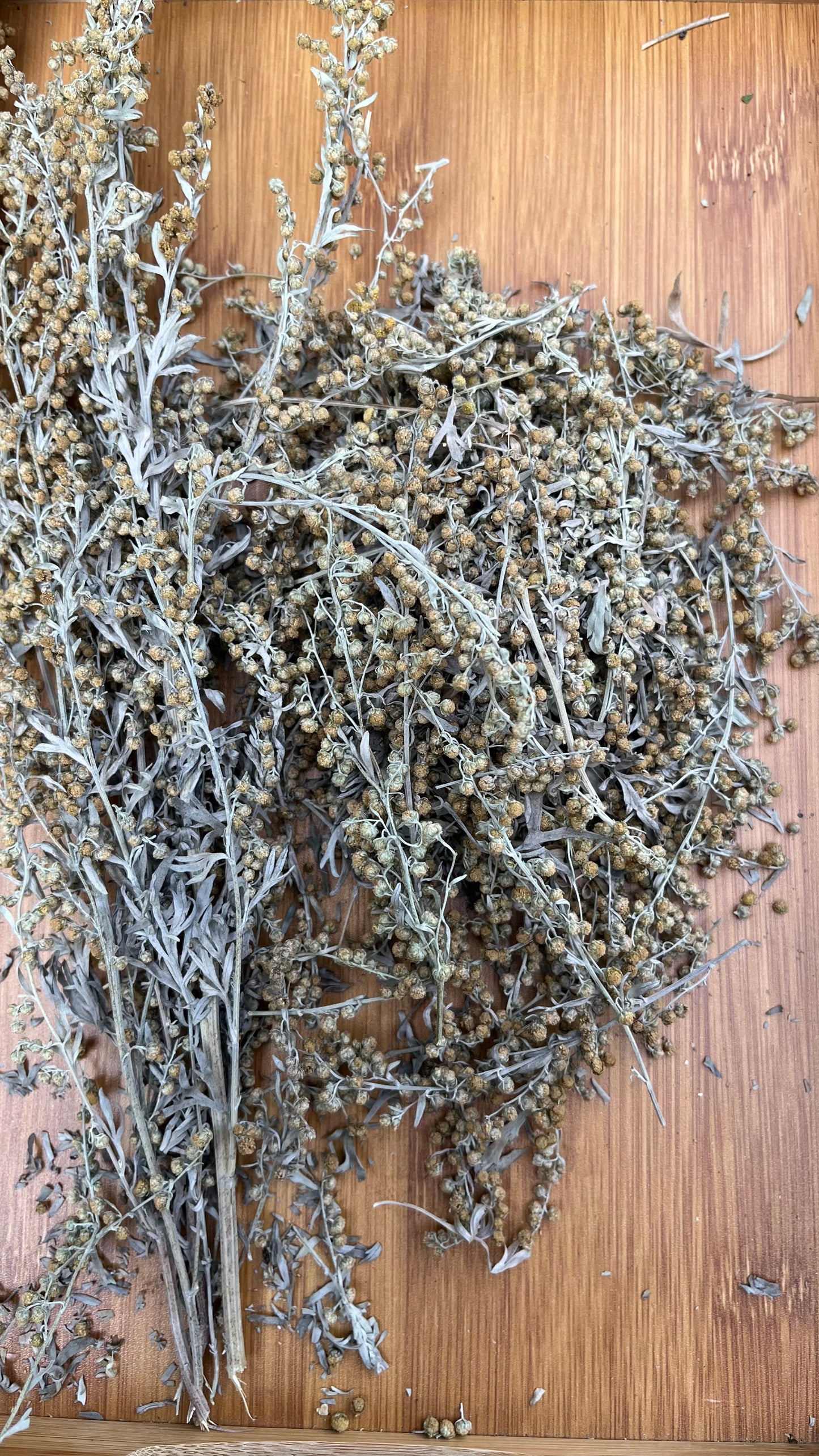NATURE'S WISDOM
Wild Wormwood leaves & flowers
Wild Wormwood leaves & flowers
Couldn't load pickup availability
Wildcrafted Wormwood (Artemisia absinthium).
Origin: Alberta, Canada
50 grams
Wormwood has long been sought for its pain-relieving and anti-inflammatory properties. Historically, wormwood has been used to treat pain from labor, premenstrual pain, and joint and muscle pain.
For example, this herb may help relieve osteoarthritis, a painful condition resulting from joint inflammation.
Boasts antioxidant properties.
Besides thujone, another notable wormwood compound is chamazulene. It acts as an antioxidant and may combat oxidative stress in your body, which is associated with cancer, heart disease, Alzheimer’s, and other ailments.
May fight inflammation.
Artemisinin, another plant compound found in wormwood, may help fight inflammation in your body. Artemisinin is thought to inhibit cytokines, which are proteins secreted by your immune system that promote inflammation.
Studies suggest that wormwood may help relieve Crohn’s disease, which is characterized by inflammation of the lining of the digestive tract. Its symptoms may include diarrhea, fatigue, abdominal cramps, and other digestive issues.
May fights bacteria and fungus.
Wormwood has also been shown to have potent antibacterial and antifungal activity. Different compounds are thought responsible for these effects, including chemicals called terpenes that give certain plants their aromatic scent. This includes a terpene called camphor.
Wormwood's antifungal activity may also act against common fungi like Candida albicans (the type that causes yeast infections and oral thrush).
Wormwood has demonstrated activity against Staphylococcus aureus, a bacteria that is one of the leading causes of skin and soft tissue infections.
May aids in digestion.
Wormwood has long been used to treat indigestion, flatulence, gastritis, and symptoms of gallbladder disease. It is thought that terpenes in wormwood stimulate saliva, stomach mucus, and intestinal secretions that can help ease digestive symptoms. At the same time, they may help reduce stomach acids that contribute to peptic ulcers and acid reflux.
You can use Usnea in many forms — including dried herb, tea, capsule, tincture.
Dosing:
Decoction (tea):
- Add 1/2 to 1 teaspoon of dried wormwood leaves to one cup of boiling water.
- Let it steep for five to 15 minutes. It’s important that you use no more than one teaspoon of the leaves as they’re very strong and bitter. Longer steep time will make for a stronger wormwood tea, but also a more bitter tea.
- Wormwood tea should be taken unsweetened to have the best effect, but you can counter the bitterness by adding dried peppermint, anise or lemon juice to taste.
- Drink 1/3 cup, 3x per/day before meal.
- It should always be taken in small doses as directed and for no longer than 4 weeks at a time.
For intestinal concerns like worms or parasites, it’s best to take powdered wormwood in pill form.
Contraindications.
Because wormwood contains ingredients that may have toxic effects, people with certain medical conditions should not take wormwood, including those with:
Pregnancy or breastfeeding: Animal studies show that wormwood may cause miscarriage.
Epilepsy or other seizure disorders: Wormwood may increase the risk of seizures and reduce the effects of some anti-seizure drugs.
Kidney disease: Wormwood is toxic to the kidneys and can lead to kidney failure, particularly in people with chronic kidney disease.
Allergies: Wormwood is part of the Asteraceae family. If you are allergic to plants like asters, ragweed, or marigolds, avoid wormwood.
Heart disease: If you take Coumadin (warfarin) for heart disease, wormwood can increase the effects of the blood thinner and cause bleeding.
Wormwood is not safe for children under 12 years old.
Speak with your doctor before using this herb if you are taking medication or have any ongoing health concerns, especially if you are pregnant.
The information above is for educational purposes only. It is not intended to diagnose, cure, treat or prevent disease. Individual results may vary, and before using any supplements, it is always advisable to consult with your own health care provider.


